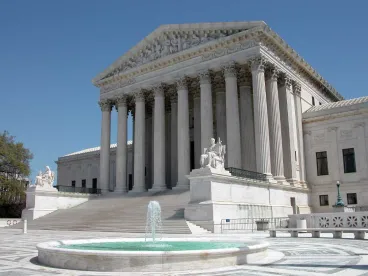As the end of the term approaches, the Court is increasingly divided in its decisions. However, the composition of the majorities is not often the 6-3 conservative/liberal division stereotype that many observers, critics, and media expect. As several key decisions show today, the Chief Justice has taken up the center ground and, as I’ve suggested before, often has the ability to bring Justice Kavanaugh with him, as they, to paraphrase the country singer Maren Morris, meet in the middle.
The blockbuster opinion of the day is Moore v. Harper, which interpreted the Elections Clause of the Federal Constitution requiring “the Legislature” of each state to prescribe the rules governing federal elections. Art. I, §4, cl. 1. The Supreme Court today rejected the so-called “independent state legislature” theory that embodied the claim that the Elections Clause vests state legislatures with authority to set rules governing federal elections free from restrictions imposed by state constitutions and laws. The decision will surprise some Court critics for at least three reasons. The first is that the opinion is written by the Chief Justice, whose view of the case not only attracted Justice Kavanaugh (who concurred in a manner consistent with his questioning at oral argument) but also brought along Justice Barrett. Justices Thomas, Alito, and Gorsuch were the only dissenters. The second reason is that the case was decided rather than being held moot—more on that in a bit. The third reason lies in what seems to be a trend in the Court. Taken in conjunction with the recent Alabama redistricting case, it is apparent that there is a clear majority that is taking a strong pro-voting rights stance. (Full disclosure: This writer is a trustee of the Campaign Legal Center, the nation’s leading voting rights litigating and policy organization, which filed briefs with the Court in both cases. Separately, he also is an amicus curiae in the Moore case and has published opinion pieces opposing the independent state legislature theory.)
Going back to Marbury v. Madison, the Chief Justice notes that the Elections Clause does not vest exclusive and independent authority in state legislatures to set the rules regarding federal elections. Marbury proclaimed the Supreme Court’s authority to invalidate laws that violate the Federal Constitution. But Marbury did not invent the concept of judicial review. Indeed, even before the Constitutional Convention, state courts had already begun to impose restraints on state legislatures. Indeed, James Madison extolled the practice, as, of course, did Chief Justice John Marshall. Especially in light of this clear history, the Court holds that the Elections Clause does not carve out an exception to the fundamental principle that when state legislatures prescribe the rules concerning federal elections, they remain subject to the ordinary exercise of state judicial review.
The instant case arose when various plaintiffs challenged North Carolina’s congressional districting map as an impermissible partisan gerrymander that violated the North Carolina Constitution, which provides that “[a]ll elections shall be free.” Relying on that provision, as well as the state constitution’s equal protection, free speech, and free assembly clauses, the North Carolina Supreme Court struck down the legislature’s map, concluding the legislature deliberately drew it to favor Republican candidates. The legislature then asserted an alleged right essentially to overrule the North Carolina Supreme Court, and the case has had several iterations, most recently in light of the legislature’s having gained a Republican majority. So, besides the issue of whether it is the court, rather than the legislature, that has the final word on what the law is, there was a substantial question as to whether the case was moot. The Court held that if the judgment in the first iteration of the case were reversed, which the North Carolina Supreme Court did not do, a 2021 redistricting plan enacted by the legislature would again take effect. Accordingly, the Supreme Court holds that the parties continue to have a “personal stake in the ultimate disposition of the lawsuit.” A North Carolina statute with specific application to the instant case confirms that the controversy remains live, and the U.S. Supreme Court has held that such “trigger provisions” are sufficient to avoid mootness under Article III. The Supreme Court also has jurisdiction to review the judgment as to the initial iteration of the case under 28 U. S. C. §1257(a), which provides for the Supreme Court’s exercise of jurisdiction over “[f]inal judgments or decrees rendered by the highest court of a State in which a decision could be had.” The Chief Justice notes further that the Court has “recurringly encountered situations in which the highest court of a State has finally determined the federal issue present in a particular case, but in which there are further proceedings in the lower state courts to come.” The dissenters, as one might expect, take issue with the finding of no mootness.
Finally, because the issue wasn’t presented to the Supreme Court, the Court did not deal with the hypothetical claim that in interpreting state law in the election realm, the state courts might have impermissibly exceeded the bounds of ordinary judicial review as to unconstitutionally intrude upon the role specifically reserved to state legislatures by Article I, Section 4, of the Federal Constitution. That will be an issue for the future, if ever. For today, the judgment of the North Carolina Supreme Court is affirmed through an opinion that (notwithstanding my bias as a successful amicus) is a fine textbook exemplar of constitutional law and constitutional history.
A very different kind of case is Mallory v. Norfolk Southern Railway, Co. The issue there was whether a Pennsylvania law requiring an out-of-state firm to answer in the Commonwealth any suits against it in exchange for status as a registered foreign corporation violates the Due Process Clause. The main point of the case is whether an aged precedent, Pennsylvania Fire Ins. Co. of Philadelphia v. Gold Issue Mining & Milling Co., 243 U. S. 93 (1917), still is in force. Writing for himself and Justices Thomas, Alito, Sotomayor, and Jackson (several of whom also filed concurring opinions), the Court held that the case still rules and that its holding mandates that Mallory’s suit does not violate the due process rights of the railroad. In something of a reverse lineup to that in the Moore case, while the alliance of the Chief Justice and Justices Kagan, Kavanaugh, and Barrett persists, this time they are (in an opinion written by Justice Barrett) the dissenters.
Here, much like the Missouri law that the Court in Pennsylvania Fire found to comport with the Due Process Clause, the Pennsylvania law at issue provides that an out-of-state corporation “may not do business in this Commonwealth until it registers with” the Department of State. Pennsylvania law is explicit that “qualification as a foreign corporation” shall permit state courts to “exercise general personal jurisdiction” over a registered foreign corporation, just as they can over domestic corporations. Norfolk Southern has complied with this law since 1998, when it registered to do business in Pennsylvania, and thus received the benefits and burdens shared by domestic corporations, including amenability to suit in state court on any claim. That 20-year history in which Norfolk Southern agreed to be sued in Pennsylvania satisfies due process, notwithstanding the fact that Mallory no longer lives in the state and that his suit did not accrue there. The majority declined to speculate whether any other statutory scheme and set of facts would suffice to establish consent to suit. Notwithstanding the disagreement of the dissenters, the facts here are sufficient to fall within the rule of Pennsylvania Fire.
Another alliance of Justices that counters various stereotypes was arrayed in Justice Kagan’s majority opinion in Counterman v. Colorado, in which she wrote for herself, the Chief Justice and Justices Alito, Kavanaugh, and Jackson, with Justices Sotomayor and Gorsuch concurring and Justices Barrett and Thomas dissenting. The majority holds that, in true-threat cases, a state must prove that the defendant had some subjective understanding of his statements’ threatening nature, but the First Amendment requires no more demanding a showing than recklessness. The First Amendment permits restrictions upon the content of speech in a few limited areas. One of these historical and traditional exceptions is “true threats,” which are “serious expression[s]” conveying that a speaker means to “commit an act of unlawful violence.” The existence of such a threat depends not on “the mental state of the author” but on “what the statement conveys” to the person on the receiving end. Recklessness can satisfy this standard. However, because Counterman—who sent hundreds of messages to a country musician he had never met—was prosecuted in accordance with an objective standard under which the state had to show only that a reasonable person would understand his statements as threats, but not that the defendant had any awareness on his part that the statements could be understood that way, his conviction violated the First Amendment. The case is remanded to state court for further proceedings.
An interesting aspect of Justice Thomas’s dissent was his criticism of the majority’s reference to the First Amendment libel case of New York Times Co. v. Sullivan, 376 U. S. 254 (1964). This is just another marker of the fact that Thomas would like the case to be overturned.
All in all, today was an interesting day at the Court and a most important one for the country with respect to minority voting rights.




 />i
/>i

